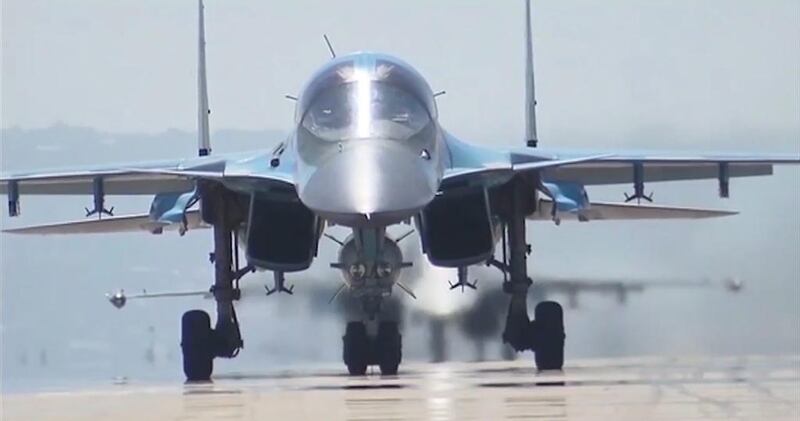ABU DHABI // Russian president Vladimir Putin surprised the key players of the Syrian war when he announced that most of his military personnel and fighter jets were leaving the country after a six-month intervention.
While the effects of the Russian redeployment – or even its true extent – remain to be seen, the move is clearly a significant moment in the Syrian conflict with a number of potential consequences both on the battlefield and the negotiating table.
The announcement came on Monday, the first day that indirect peace talks between the Syrian opposition and Bashar Al Assad regime resumed in Geneva – the most serious attempt yet in the five-year conflict.
While Mr Putin claimed that his intervention in Syria was a bid to fight ISIL and Al Qaeda extremists, in action it was much more focused on beating back mainstream US and Arab-backed rebels who had pushed the regime to the brink of defeat. All with the aim of securing the survival of Moscow’s only client state in the Middle East.
After 9,000 Russian air strike sorties, this goal has been accomplished. Regime forces and Iran-backed Shiite militias have succeeded in retaking most of the key city Aleppo, cutting off most rebel supply routes to Turkey and retaking around 400 villages and towns, according to Russia’s defence minister, Sergey Shoygu.
Al Qaeda’s Syrian affiliate, Jabhat Al Nusra, on Tuesday vowed to push a new offensive in the wake of the withdrawal. “It is clear that Russia has suffered defeat, and within the next 48 hours Al Nusra will launch an offensive in Syria,” a commander of the group said.
If the extremist group does try to recapture territory, however, it may find very little success. Moscow will maintain its new Hmeimin airbase in Syria, as well as its older naval port at Tartus, and will continue to launch air strikes against “terrorists”, said Russia’s deputy defence minister Nikolai Pankov. On Tuesday, Russian helicopters pounded ISIL positions around the ancient city of Palmyra as Syrian troops pressed a ground advance.
The drawdown indicates that the intervention has seemingly met Mr Putin’s discrete goals of not only securing the Assad regime, but also making Russia a regional player and an indispensable partner to finding a political settlement to the war, ending its growing international isolation.
Russia will also leave in place the S-400 air defence system it deployed to Syria last November. The deployment tipped the balance of the war in the regime’s favour by changing the risk calculation for the air forces of pro-opposition countries, making air strikes against Mr Al Assad’s forces virtually impossible.
With these tactical victories in hand, Mr Putin likely calculated that it made little domestic political sense to leave Russian soldiers vulnerable on the ground, especially as the “cessation of hostilities” agreement held despite many breaches, and negotiations resumed.
The Geneva talks looked to founder on the same questions that had caused past rounds to fail – most crucially the fate of Mr Al Assad. But the Russian withdrawal, regardless of how much its actual presence is reduced, sends a strong message that Mr Putin would like to see a deal emerge.
Indeed, the opposition has cautiously embraced the move as a sign of newfound seriousness, and one that reduces the regime’s overwhelming military superiority – despite the fact that the Russian intervention has left them with the upper hand, at least for now.
The withdrawal “is a positive step which will help to move forward the negotiations” and bring an end to Mr Al Assad’s “dictatorship and his crimes”, said Salem Al Muslet, a spokesman for the High Negotiations Committee, which represents the main opposition grouping at negotiations.
However, Mr Al Muslet added, the opposition is withholding judgement of Russia’s move until it sees “actions on the ground”.
Some observers also saw the drawdown as a clear signal that Mr Putin was losing patience with Mr Al Assad, who has shown no signs of offering realistic compromises in the negotiations, and that Damascus will now be pressured to engage seriously in the talks.
tkhan@thenational.ae





